The Malaysia Digital Economy Forum with the theme “Transforming Business and Society through eCommerce” held on Thursday is testament to the Government’s commitment in driving the nation’s digital economy agenda. Hosted jointly by the Ministry of International Trade and Industry (MITI) and the Malaysia Digital Economy Corporation (MDEC), the Forum was attended by some 3,000 participants, mostly SMEs and logistics players in the digital business ecosystem as well as members of the public. Also present were officials from embassies and consulates in Malaysia.

Fifty-three (53) exhibitors from various eCommerce segments, including eMarketplaces, telco players, payment solution providers, logistics and fulfillment players, Chambers of Commerce and associations; as well as online sellers including SMEs, participated in the Forum.
International Trade and Industry Minister, YB Dato’ Sri Mustapa Mohamed said, “Over the years, Malaysia’s digital economy has seen exponential growth. To date, 58,824 online businesses have already registered with the Companies Commission of Malaysia (SSM). Latest numbers from the Department of Statistics Malaysia (DOSM) also indicate that the digital economy accounted for 18.2% of the country’s GDP in 2016 while the share of eCommerce in the national GDP has increased to 6.1% compared to 5.9% in 2015. ”
“Nine (9) out of 10 business establishments in Malaysia are SMEs. Twenty eight (28) percent of these have online presence and 15% already use that presence for export purposes. The Government is committed to undertake initiatives that will further push these numbers.”
“The launch of the DFTZ Pilot Project by YAB Prime Minister last year also saw growing interest among local and international eCommerce players. The Government will work towards ensuring the sustainability of the 1,998 SMEs that are already DFTZ-listed, and assist more SMEs to list on the same, in line with the national aspiration of ensuring SMEs are future-ready and equipped to venture into cross-border eCommerce,” he added.
The DFTZ is a milestone in the national digital economy agenda, providing a sustainable platform for SMEs and enterprises to conduct their businesses online. A growing number of companies have started to export via the DFTZ, and this will only increase as more and more players understand the value of participating in this initiative.
Dato’ Sri Mustapa also highlighted that “The DFTZ is already a success in institutionalising some of the trade facilitation measures undertaken by the government. These include reduced cargo clearance time from six to three hours in KLIA Air-Cargo Terminal 1 (KACT1), KLIA as well as further simplified documentation procedures. Going forward, the DFTZ could be the first of many more institutionalised trade facilitation measures expanded to other parts of the country, which will only serve to facilitate local businesses sourcing from third country markets.”
Speaking at the event, Datuk Yasmin Mahmood, CEO, Malaysia Digital Economy Corporation (MDEC) said, “The Forum highlights Government’s efforts to promote digital transformation across the most important sector – the SMEs. SME development will remain a key focus area under the Government’s digital transformation agenda. The DFTZ initiative is a game changer for our digital economy that will focus on providing a state-of-the-art platform which gives convenience for SMEs to conduct their businesses and services. This will ensure that the DFTZ will allow equal opportunities to Malaysian SMEs and focus on encouraging them to penetrate the export market and improve our cross-border efficiency,”
“This year, we will take this vision further by focusing on DFTZ’s expansion to include trade by sea, changing the global trade market. The first phase of this expansion will include locations within Malaysia, such as Port Klang and Bukit Kayu Hitam,” she further added.
According to Malaysia External Trade Development Corporation’s (MATRADE) Chief Executive Officer Ir. Dr. Mohd Shahreen Madros, the DFTZ is set to boost Malaysian companies’ participation in export. “The current contribution of 18.6% in export by SMEs is still relatively small considering SMEs making up 98.5% of business establishments in Malaysia. We are confident the DFTZ will be a catalyst to increase this contribution to 23% or more by 2020. Complementing the physical and soft infrastructure provided through DFTZ is our eTRADE Programme, incepted in 2014 to push Malaysian companies’ exports through eCommerce platforms. In 2017, of the 1,998 companies recruited under the DFTZ initiative, 1,378 are eTRADE participants,” he said.
During the Forum, a number of SMEs were also recognised for their success in expanding their businesses into third country markets, through the use of eCommerce.
“In a digitised world, SMEs today have no other option but must establish their presence in eCommerce with the ultimate goal of exporting their products and services across border. SMEs must quickly shape up and align themselves to the opportunities that are abound in a digitalised world and make a significant presence in the global market”, said Datuk (Dr.) Hafsah Hashim, Chief Executive Officer, SME Corp. Malaysia.
The Malaysia Digital Economy Forum is aimed at educating local stakeholders, including SMEs along the value chain, on the importance of digitisation and encourage them to leverage on its opportunities for their businesses. The Forum featured presentations and panel discussions by prominent eCommerce players on a variety of topics, including the role of digitisation in transforming businesses, MITI’s ongoing work in Industry 4.0 and its linkage to the digital agenda, eCommerce 101 for SMEs wishing to export, as well as cashless initiatives.
At the sidelines, MDEC also hosted a dedicated session to encourage SMEs to list on DFTZ, as well as participate in the Go-eCommerce online training platform, #MYCYBERSALE and eUSAHAWAN.
The Forum witnessed several MoU exchange between the National ICT Association of Malaysia (PIKOM) with local partners, namely the Malaysia Digital Chamber of Commerce (MDCC), Malaysia Wholesalers Association (PPM), the Malaysian Association of Tour & Travel Agents (MATTA), Malaysia Retail Chain Association (MRCA) and SME Association of Malaysia (SMEAM). The MoUs aim to further cement collaborative initiatives that will serve to catalyse the growth of the eCommerce sector in Malaysia, by facilitating Malaysian SMEs to increase their online presence and access third country markets.
Ganesh Kumar Bangah, Chairman of PIKOM commented, “We are thrilled to embark on this journey towards sustaining the eCommerce growth momentum of the country. We look forward to empowering Malaysian SMEs to embrace digitisation which will help spur the growth of their online businesses.”
Dato’ Sri Mustapa later chaired the first National eCommerce Council (NeCC) meeting for the year, to monitor the progress of implementation of the National eCommerce Strategic Roadmap (NeSR) and enhancing the competitiveness of the eCommerce ecosystem. Also present was Sarawak’s Ministry of Trade and eCommerce (MITeC), that is currently working actively towards embracing strategic digital initiatives at the State level.











